TV Station MBS
 A Passionate Challenger | Weaving the Tradition in a Tropical Forest
A Passionate Challenger | Weaving the Tradition in a Tropical Forest
DC281759![]()
情熱大陸 | テキスタイル・デザイナー・森本喜久男 [MBS]
![]()
![]()
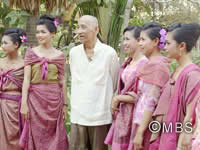
|Length : 25 |Year : 2017 |
Near Siem Reap in Cambodia, known for the famous ruins of Angkor, is “a weaving village” uncommon even in this world. Using the abundant natural resources available in the area, and traditional Cambodian weaving techniques, textiles of high artistic quality are produced here that have garnered worldwide acclaim. Fourteen years ago, this area was a wasteland. Today, the villagers create handwoven silk fabric from start to finish - from raising silkworms, to creating dyes to weaving. And the man who made this possible is a former Yuzen silk artisan, Kikuo Morimoto, from Kyoto. When he was in his thirties, Morimoto volunteered at a refugee camp in Cambodia and came upon a single piece of traditional Cambodian textile. Due to years of internal conflicts, the Khmer silk culture was fading into oblivion. Inspired by its beauty, this man from Japan set down his roots in a country foreign to him, and dedicated half his adult life to restoring the ancient technique, and almost single-handedly, pulled off a miracle. However, he was diagnosed with cancer and given five years to live. This is the fifth year, and it is also the season for the “silkworm festival” which is held annually in the village. It was begun by Morimoto in reverence of the silkworms who, in death, leave behind their beautiful threads. The festival is a venue to introduce newly woven textiles as well as to put the village on the map and help it prosper. Realizing that this could very well be his last festival, Morimoto reflects on the legacy he hopes to leave behind -- his fervent wish that the village will continue to thrive, and pass down the beautiful traditional silk-weaving culture to future generations. How will the festival turn out? Our cameras follow Morimoto and the villagers through this important and hectic period.
 A Passionate Challenger | Treasure Hunter in Tropical Rivers
A Passionate Challenger | Treasure Hunter in Tropical Rivers
DC281659![]()
情熱大陸 | 淡水魚研究家 佐藤智之 [MBS]
![]()
![]()
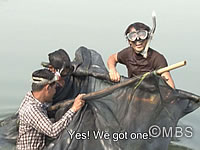
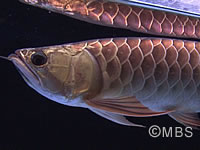
|Length : 24min |Year : 2016 |
Cambodia boasts nearly 500 species of freshwater fish. More research on freshwater fish needs to be done on a wider scale because so little is known even about the types of fishes that exist there. In his quest to encounter every fish that exists in Cambodia, Tomoyuki Sato, an avid aquarist, has been cataloguing the freshwater fishes of Cambodia with great zeal. At the same time, the Cambodian arowana conservation project has hired him to study the Asian arowana which has been declared an endangered species. We take a fascinating look at this man, Tomoyuki Sato, and his simple and honest desire to “encounter every fish that exists.”
 A Passionate Challenger | A Little Make-up Goes a Long Way: A Japanese Woman’s Efforts to Win Smiles
A Passionate Challenger | A Little Make-up Goes a Long Way: A Japanese Woman’s Efforts to Win Smiles
DC281556![]()
情熱大陸 | 社会企業家・向田麻衣 [MBS]
![]()
![]()
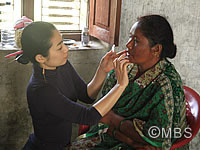
|Length : 24min |Year : 2015 |
Nepal is one of the most underprivileged nations in the world. Here, where women live in dire conditions, a lone Japanese woman strives to render aid through “facial make-up.” She is social entrepreneur Mai Mukaida.
In 2009, Mukaida began the Coffret Project which sought to bring smiles and hope to women victimized by prostitution and rape. The idea was to support these women through make-up; to instill confidence in them to get through life.
One day Mukaida journeys to an impoverished village and encounters young women who were once a type of indentured slavery. After talking to them, she gently applies make-up on them. What the camera lens captures is...
 A Passionate Challenger | A Japanese Woman’s Hunt for the Elusive White Cacao
A Passionate Challenger | A Japanese Woman’s Hunt for the Elusive White Cacao
DC281555![]()
情熱大陸 | カカオハンター・小方真弓 [MBS]
![]()
![]()
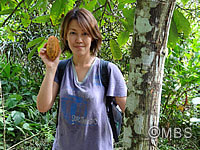
|Length : 24min |Year : 2015 |
Mayumi Ogata is a Japanese woman with an unusual profession known as "cacao hunter." She searches for cacao while keeping an eye on market trends as well as the cacao-growing industry’s future.
Ogata started out at a chocolate ingredients supplier, but she developed a keen interest in cacao itself and left the firm in 2003. Subsequently, she traveled to cacao-growing nations, researching each region's cacao industry. With the experience she has gained, she now works on improving the quality of cacao beans and trees and developing new chocolate products.
One day Ogata finds the mysterious cacao, but all she brings back is a small cutting. She reasons that by planting it and protecting the variety, it could one day provide a living to people in the area. She believes that hunters must not plunder.
 A Passionate Challenger | Biologist Unlocks the Secret Life of Marine Animals
A Passionate Challenger | Biologist Unlocks the Secret Life of Marine Animals
DC281454![]()
情熱大陸 | 海洋生物学者 渡辺佑基 [MBS]
![]()
![]()
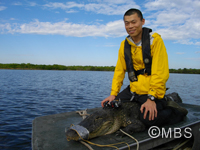
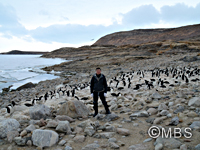
|Length : 24min. |Year : 2014 |
The behavior of marine animals still remains a mystery. A world-renowned biologist, Yuki Watanabe, researches and records their behavior using a method called bio logging. By attaching a motion recorder called logger and a miniature camera to the animal, the secret lives of these animals become clearer through captured footage. It is the most advanced field of research that has rapidly developed over the last 20 years in the biology field.
Watanabe’s biggest accomplishment is the invention of logger retrieval system. Until now, bio logging was limited to animals that returned to their nest since that was the only way the logger could be retrieved. But Watanabe solved this problem by utilizing IT equipment and intelligence which instantly broadened the field of research. Joint research offers flocked to Watanabe from around the world and he became known as the “Indy Jones of the biological world.”
When Watanabe went to Antarctica as a member of the Antarctic expedition team, he captured footage of the Adelie penguin by attaching a camera to the penguin. That footage has garnered a lot of attention as it is the first time anyone has clearly seen a penguin eating its prey in its natural setting. It has been assumed that tuna swim at a high speed at almost 80 km/hour. But based on Watanabe’s research, they swim at about 3 – 8 km/hour. Even in emergency situations, they only reach speeds of up to 30 km/hour. In this way, Watanabe works to clarify the behavior and habits of marine animals which are often shrouded in mystery.
The program follows Mr. Watanabe for three years. It introduces a joint research project he did with Australia’s Tasmania University on the broadnose sevengill shark. It also presents a lot of the world premier footages, captured by cameras attached to marine animals.














